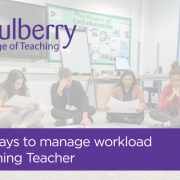A new school year: looking ahead at what’s to come for beginning teachers
September always brings a sense of fresh beginnings. As pupils return to classrooms and teachers set out plans for the year, those just starting out on their journey into teaching are preparing for a year like no other.
For beginning teachers, this is the moment when training transforms into practice, when theory takes root in the classroom and when the identity of “student” shifts into “teacher.”
The start of a journey
Becoming a teacher is not something that happens overnight. For many, September marks the first time they will enter a classroom with their teacher persona, guiding learning while still learning themselves. It’s a time full of anticipation, nerves and excitement.
At Mulberry College of Teaching, we see this transition as one of the most powerful moments in education. You are stepping into a role where every decision – from how you welcome pupils at the door to how you design a lesson – begins to shape not only your practice, but also young people’s lives.
Building confidence step by step
No beginning teacher is expected to have everything figured out on day one. The year ahead is about growth- testing ideas, reflecting on what works and building resilience through challenge. Mistakes will happen, but each one is part of the process. With mentors, peers and supportive schools around you, the journey becomes less daunting and more empowering.
The transformation from trainee to teacher comes gradually, through moments of progress: the first successful learning episode, the first time a pupil grasps a concept because of your explanation, the first parent you speak to with confidence. These small milestones add up, and by the end of the year, you will look back and realise just how far you’ve come.
The importance of community
Teaching is a collective profession, never a solitary one. In East London, our schools reflect a vibrant mix of cultures, languages, and life stories. For beginning teachers, this means learning to celebrate diversity and build classrooms where every pupil feels represented and valued.
The support network around you – from mentors to fellow trainees – becomes a vital part of your journey. Sharing challenges, strategies and successes helps you grow, while also reminding you that you are not alone in this transformation.
Looking ahead
This September is just the start. Over the coming year, beginning teachers will find their voice, develop their craft and lay the foundations of a long and meaningful career.
At Mulberry College of Teaching, we believe every teacher in training has the potential to make a difference and we are here to ensure you do so with confidence, purpose, and joy.
If you are considering becoming a teacher in 2026–27, applications open Tuesday 7th October at 9 am. Your own journey could begin with us, rooted in East London’s schools and communities.



